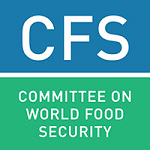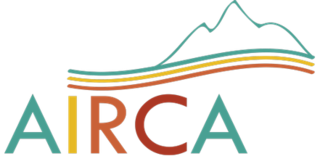This article needs additional citations for verification .(June 2024) |

The Committee on World Food Security (CFS) is an intergovernmental body within the United Nations System.
This article needs additional citations for verification .(June 2024) |

The Committee on World Food Security (CFS) is an intergovernmental body within the United Nations System.
The Committee on World Food Security (CFS) was established in 1974 as an intergovernmental body to serve as a forum in the United Nations System for review and follow-up of policies concerning world food security, including any and all production, physical, and economic access to food. [1]
It was reformed in 2009 to become a multi-stakeholder committee. [1] [2]
Stockholm International Peace Research Institute constitutes a key role in achieving the UN's Sustainable Development Goal (SDG) No.2. [3]
The Committee on World Food Security's tasks are to:[ citation needed ]
The CFS has a permanent Secretariat located in the Food and Agriculture Organization of the United Nations (FAO), headquartered in Rome, Italy, which includes members from the World Food Programme (WFP) and the International Fund for Agricultural Development (IFAD). Its task is to support the Plenary, the Bureau and Advisory Group and the HLPE-FSN in their work. [4]
The annual Plenary session is the forum for debate, decision-taking, coordination, and convergence by all stakeholders at a global level. [4]
The CFS Bureau is the executive division of the CFS. It is made up of a chairperson and 12 member countries. [4] In 2023, Nosipho Nausca-Jean Jezile, Ambassador of the Republic of South Africa to the FAO and the other Rome-based UN agencies, was elected chair, replacing Gabriel Ferrero from Spain, who had been chair for the previous two years. [5]
The Advisory Group comprises five categories: [4] [6]
The CSIPM was established in 2010, for the purpose of facilitating participation by civil society, which in turn informs the policy processes of the CFS. There are no formal members, just participating organizations that work in the area of food security and nutrition, particularly those representing marginalized groups such as smallholder family farmers, herders, landless, Indigenous peoples. Several hundred national, regional, and global organizations have participated in the CSIPM. [6] [4] As of April 2024 [update] the 11 constituencies of the CSIPM are: Smallholders Farmers, Pastoralists/Herders, Fisherfolk, Indigenous Peoples, Consumers, Urban Food Insecure, Agricultural and Food Workers, Women, Youth, Landless, and NGOs. The governing body is the Coordination Committee, made up of 22 members from 11 constituencies and 17 sub-regions. [6]

The High Level Panel of Experts on Food Security and Nutrition (HLPE-FSN) is an independent body founded in 2009 to provide scientific knowledge-based analysis and recommendations. It comprises a steering committee and a roster of experts who work in teams on specific projects. [4]
The HLPE-FSN working processes ensure "legitimacy among stakeholders and a high degree of scientific quality": they involve broad stakeholder consultations and the incorporation of different forms of knowledge and expertise, as well as a rigorous scientific peer-review process.
The HLPE-FSN has published many reports, including: [7]
As of June 2024 [update] the chair of HLPE-FSN is Akiko Suwa-Eisenmann, and Iain Wright, is vice-chair. Steering Committee members include Olanike Adeyemo, Hilal Elver, Patrick Webb, [9] and Cecilia Elizondo. [10]
Besides the CFS there are the FAO, the International Fund for Agricultural Development (IFAD), and World Food Programme (WFP), as well as the UN Food Systems Coordination Hub, all based in Rome, working on global food security, international coordination and achievement of the 17 SDGs, [11] with parallel structures causing unclear responsibilities and inefficient structures. [12]
The idea of giving different goals, namely right to food, human rights and companies interests a common table inside the CFS is considered[ by whom? ] a reason for the lack of results of CFS policies. [12]

The Food and Agriculture Organization of the United Nations (FAO) is a specialized agency of the United Nations that leads international efforts to defeat hunger and improve nutrition and food security. Its Latin motto, fiat panis, translates to "let there be bread". It was founded on 16 October 1945.

The World Food Programme (WFP) is an international organization within the United Nations that provides food assistance worldwide. It is the world's largest humanitarian organization and the leading provider of school meals. Founded in 1961, WFP is headquartered in Rome and has offices in 80 countries. As of 2021, it supported over 128 million people across more than 120 countries and territories.

In politics, humanitarian aid, and the social sciences, hunger is defined as a condition in which a person does not have the physical or financial capability to eat sufficient food to meet basic nutritional needs for a sustained period. In the field of hunger relief, the term hunger is used in a sense that goes beyond the common desire for food that all humans experience, also known as an appetite. The most extreme form of hunger, when malnutrition is widespread, and when people have started dying of starvation through lack of access to sufficient, nutritious food, leads to a declaration of famine.
The Global Forum on Agricultural Research and Innovation (GFAR) is an inclusive global forum, enabling all those concerned with the future of agriculture and its role in development around the world, to address key global needs. GFAR provides an open forum for stakeholders across the agricultural spectrum—ranging from researchers, organizations, and farmers—to participate in collaborative discussion and action around the current and future state of agriculture.
William G. Moseley is an American academic. He is the DeWitt Wallace Professor of Geography, and director of the Food, Agriculture & Society Program at Macalester College in Saint Paul, Minnesota. His research interests include tropical agriculture, food security, and development policy. He is the author of over 100 peer-reviewed articles, as well as eight books. In 2013 he won the Media Award, and in 2016 the Kwadwo Konadu-Agyemang Distinguished Africa Scholar Award, both from the American Association of Geographers. He serves on the International Steering Committee of the High Level Panel of Experts on Food Security and Nutrition of the UN Committee on World Food Security (CFS).
The International Assessment of Agricultural Knowledge, Science and Technology for Development (IAASTD) was a three-year international collaborative effort (2005–2007) initiated by the World Bank in 2002, which evaluated the relevance, quality and effectiveness of agricultural knowledge, science, and technology, and the effectiveness of public and private sector policies and institutional arrangements.

The International Day of Forests was established on the 21st day of March, by resolution of the United Nations General Assembly on November 28, 2013. Each year, various events celebrate and raise awareness of the importance of all types of forests, and trees outside forests, for the benefit of current and future generations. Countries are encouraged to undertake efforts to organize local, national, and international activities involving forests and trees, such as tree planting campaigns, on International Day of Forests. The Secretariat of the United Nations Forum on Forests, in collaboration with the Food and Agriculture Organization, facilitates the implementation of such events in collaboration with governments, the Collaborative Partnership on Forests, and international, regional and subregional organizations. International Day of Forests was observed for the first time on March 21, 2013.
Multistakeholder governance is a practice of governance that employs bringing multiple stakeholders together to participate in dialogue, decision making, and implementation of responses to jointly perceived problems. The principle behind such a structure is that if enough input is provided by multiple types of actors involved in a question, the eventual consensual decision gains more legitimacy, and can be more effectively implemented than a traditional state-based response. While the evolution of multistakeholder governance is occurring principally at the international level, public-private partnerships (PPPs) are domestic analogues.

The Association of International Research and Development Centers for Agriculture (AIRCA) is an international, non-profit alliance focused on increasing food security by supporting smallholder agriculture and rural enterprise within healthy, sustainable and climate-smart landscapes.
Lindiwe Sibanda Majele (born 1963) is a Zimbabwean professor, scientist, policy advocate and influencer on food systems. She currently serves as director and chair of the ARUA Centre of Excellence in Sustainable Food Systems (ARUA-SFS) at the University of Pretoria in Pretoria, South Africa as well as founder and managing director of Linds Agricultural Services Pvt Ltd. in Harare, Zimbabwe. She is currently a board member of Nestlé where she is also a member of the Sustainability Committee.

Nancy Stetson is the former United States Special Representative for Global Food Security, responsible for leading all aspects of U.S. diplomacy related to food security and nutrition, appointed by U.S. Secretary of State John Kerry on June 23, 2014. She is also the Deputy Coordinator for Diplomacy for Feed the Future - the US government's global hunger and food security initiative. In October 2016, Ambassador Stetson was the deputy head of delegation for the U.S. party to Habitat III - the United Nations Conference on Housing and Sustainable Urban Development.

Established in 1992, the Major Group for Children and Youth is the United Nations General Assembly mandated, official, formal and self-organised space for children and youth to contribute to and engage in certain intergovernmental and allied policy processes at the United Nations.
Barbara A. Burlingame is a nutrition scientist specializing in food composition, biodiversity for food and nutrition, sustainable diets and sustainable food systems, and traditional food systems of indigenous peoples. She is involved in nutrition policy development at the global level, and is currently a professor at Massey University.

Endorsed in December 2017, the United Nations Decade of Family Farming 2019-2028 seeks to place family farming at the center of national public policies and investments. In declaring this decade, the United Nations General Assembly recognized the importance of family farming in reducing poverty and improving global food security. The UN Decade of Family Farming is led by the Food and Agriculture Organization (FAO) and the International Fund for Agricultural Development (IFAD) in collaboration with governments and civil society organizations.
A number of movements seek to expand the practice of agroecology in West Africa. Agroecology is a scientific discipline, movement and practice that integrates ecology in agriculture with strong emphasis on diversification, food sovereignty, energy efficiency and sustainability. Agroecological practices apply the systems and knowledge that traditional farmers in the region have developed and inherited. The agroecological social movement empowers smallholder farmers that hold the knowledge of indigenous farming systems, however are recently engulfed by larger farms or are migrating to urban areas, looking for better paying jobs.

Sustainable Development Goal 2 aims to achieve "zero hunger". It is one of the 17 Sustainable Development Goals established by the United Nations in 2015. The official wording is: "End hunger, achieve food security and improved nutrition and promote sustainable agriculture". SDG 2 highlights the "complex inter-linkages between food security, nutrition, rural transformation and sustainable agriculture". According to the United Nations, there are around 690 million people who are hungry, which accounts for slightly less than 10 percent of the world population. One in every nine people goes to bed hungry each night, including 20 million people currently at risk of famine in South Sudan, Somalia, Yemen and Nigeria.
Sustainable Development Goals and Lebanon explains major contributions launched in Lebanon towards the advancement of the Sustainable Development Goals SDGs and the 2030 agenda.
The United Nations Forum on Sustainability Standards (UNFSS) is an initiative with a steering committee of six United Nations Agencies – Food and Agriculture Organization (FAO), International Trade Centre (ITC), UN Environment, UN Industrial Development Organization (UNIDO), United Nations Economic Commission for Europe (UNECE), and the UN Conference on Trade and Development (UNCTAD) is the secretariat of UNFSS. UNFSS headquarters are in Geneva.
The International Panel of Experts on Sustainable Food Systems (IPES-Food) is an international non-profit association, with the goal to promote transition to sustainable food systems around the world and it was registered in Belgium in the year 2015. It was founded by Daniel et Nina Carasso, Olivier De Schutter, former UN special rapporteur on the right to food, and Emile Frison, former Director General of Bioversity International to inform debates on food system reforms around the world. It conducts research focused in the domains of political economy, nutrition, climate change, ecology, agronomy, agroecology, and economics, as well as direct involvement in political processes.
Evan Fraser is a Canadian author and geographer. He is a Professor of Geography at the University of Guelph and the Director of the Arrell Food Institute.